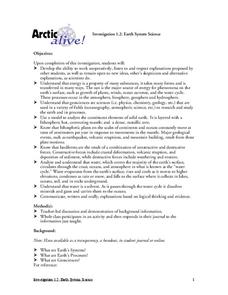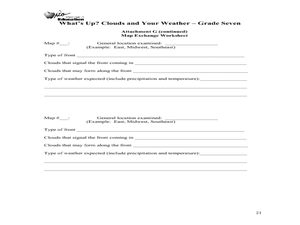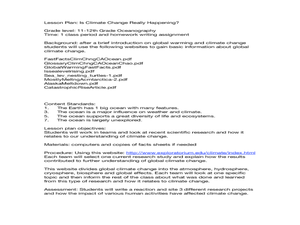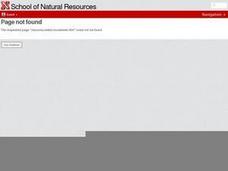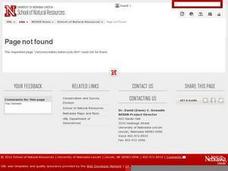Curated OER
Clouds and Your Weather
Seventh graders identify clouds and the weather associated with them. They use informational articles and personal weather observations to learn about the relationships between weather fronts and clouds.
Curated OER
The Rainforest Community
Students create a miniature rainforest ecosystem, a terrarium. Students then explain how the continuous flow of energy and food in the ecosystem allows it to sustain itself.
Curated OER
Historic Earth Science Innovations
Students research the demands or limitations on Earth scientists. In groups, they design and build a model that would be useful to them in the lab or field. They share their model and their ideas behind it to the class and answer any...
Curated OER
Earth System Science
Students explore the Earth and its ability to support life. They discuss the geosphere and the water cycle and complete the Water Wonders activity. After completing the activity, they respond in their journals and reflect upon the...
Curated OER
Outcomes Science 4
In this outcome science 4 worksheet, students apply scientific knowledge to answer and calculate a variety of questions. Students research the answer to several questions using the websites suggested.
Curated OER
Resources for Teaching about Biogeochemical Cycles
Students study the different cycles and Earth's systems. In this investigative lesson students study the nitrogen and carbon cycles, play a game pertaining to it and also participate in a class activity.
Curated OER
What's Up? Clouds and Your Weather
Seventh graders identify clouds and the weather that is associated with them. In this weather lesson students work in groups and design their own weather map.
Curated OER
Wetland Habitats
Eighth graders explore the program Alice and the Internet to research wetland habitats. In this habitat lesson plan students build their own Alice world that includes wetland habitats, food sources and ways to protect the...
Curated OER
Is Climate Change Really Happening?
Young scholars explore the impact of global warming. In this oceanography lesson, students investigate global climate change and write reaction papers about their research findings.
Curated OER
Earth's Layers Online Activity
For this Earth's layers worksheet, students click on the links in the questions about Earth's layers to find the answers to the questions and then come back and answer the questions. Students answer 12 questions total.
Curated OER
Seasons
First graders create a KWL chart about the four seasons. In this four seasons lesson plan, 1st graders continue the chart by watching videos and drawings.
Curated OER
Global Warming – More or Less
Eighth graders identify the factors that contribute to global warming. For this earth science lesson, 8th graders evaluate the impact of global warming on the planet. They discuss their views within the group.
Curated OER
Rivers for the Common Good
Students explore what effects improper waste disposal and water pollution have on the water cycle. They explore how philanthropic acts can help protect the water cycle and keep our water and planet clean.
Curated OER
Circle the Earth - Explore Surface Types on a Journey around Earth
Students use CERES percent coverage surface data with a world map in locating landmasses and bodies of water at Earth's Equator.
Curated OER
Environmental Science/Water Pollution
Students study natural habitats, aquatic life, renewable and non-renewable resources. They discuss conservation efforts for sea otters and desert toad in this units.
Curated OER
Bryant Creek Watershed Project - Making a Karst Dictionary
Young scholars explore the definitions relevant to Karst topography. They develop a Bryant Watershed Dictionary of the special words and terms that are used to talk about the topography and hydrology of the area they live in.
Curated OER
Making a Karst Dictionary
Students practice using the correct vocabulary in geology and hydrology. They use the Internet to research topics and practice their researching skills.
Curated OER
Nautical Terminology
Students read excerpts from Gulliver's Travels and note the nautical terminology. While listening to ocean-themed music, students complete worksheets about sea and boat terms and create their own semaphore system. They challenge fellow...
Curated OER
South Dakota Quarter Reverse: Four Famous Faces
Learners recognize the faces of the four presidents on the South Dakota quarter reverse. After discussing the duties and responsibilities of presidents, they list the contributions of the four presidents. They decide which presidents are...
Curated OER
Water Table
Middle schoolers study the meaning of a water table and how it contributes to the existence of streams, swamps, and lakes in Nebraska. They conduct an experiment and complete a diagram of the hydrologic cycle.
Curated OER
Water Flow Through Local Soils
Young scholars examine the relationship between particle size and rate of water flow through soil. They collect soil samples, make predictions, conduct a water flow experiment, analyze the data, and answer conclusion questions.
Curated OER
Storage, Use, Pollution,& Clean Up of Water
Students synthesize water resource educational posters into class presentations based on the poster's theme. Working in groups, they make presentations on wastewater, water uses, watersheds, groundwater, wetlands,water quality, and...
Curated OER
Flood Control Project
High schoolers examine the reasons why dams were built in Nebraska. They identify factors that need to be considered when building a dam. They create a dam of their own.
Curated OER
The Nebraska Brochure
Students research the physical attributes of Nebraska. They work together to create a brochure highlighting the topic of their choice. They share their brochure to the class.
Other popular searches
- Biosphere and Hydrosphere
- Hydrosphere and Lithosphere
- Lithosphere Hydrosphere
- Hydrosphere +"Atmosphere"
- Hydrosphere "Atmosphere
- Hydrosphere and Atmosphere
- Hydrosphere and Pollution
- Lithosphere, Hydrosphere
- Hydrosphere Atmosphere
- Hydrosphere "Atmosphere"
- Hydrosphere +Atmosphere
- Hydrosphere "Stmosphere





